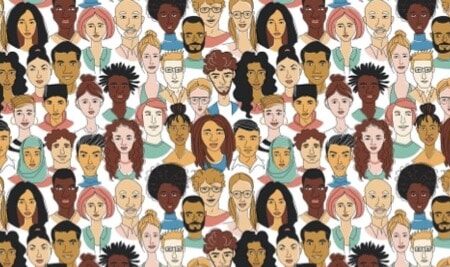The issue of the race question today commonly rests on the popular notion that race is fundamentally a political issue – that it is an important material subject that people should be discussing or arguing over.
However, in truth and reality, race as a categorising term is not a political issue but rather a social sickness that should never have been allowed to divide us as people, starting around 500 years ago when societies allowed themselves to be influenced by the few intellectually bankrupt and lazy-minded ‘explorers’ who created the myth of difference between individuals on the grounds of their having ‘white skin’, ‘black skin’ and so on.
What is important to note is that where the explorers came from and where they were headed are irrelevant. It does not matter what mission they were on, whether the mission was successful or unsuccessful, or anything else of the sort. They are not here to explain themselves, or even to fix the mess they have left us.
What really matters now is what we do about the mess – race, a concept that divides us unnecessarily on a global scale and is poisonous to our very humanity. Despite this, we as a people continue to fall into the trap.
What the concept of race essentially does, is separate us from our naturally beautiful individuality and also our beautifully diverse collective beauty as humanity, our true diversity that rests in the beauty of our differences more than our sameness as people.
The concept of race as a category was developed as a result of historical social conventions rather than on the basis of what is true and factual about individuals.
It was common for people of earlier generations – around the time that race was first introduced – to engage in culturally inspired conquests. This was true of Africa before white people arrived, and no less true of everyone else, from Europeans to Asians. This was how things typically went at the time.
What is the origin of, for instance, the Bapedi or Zulu kingdoms in South Africa? It is crucial that, at the very least, South Africans familiarise themselves with such histories, learn about other history, and contrast them. By doing this, I’m confident that we will have a better view of history – one that is based on an accurate and broad perspective rather than a selective and narrow one.
The complete truth – rather than simply your ‘reality’ or viewpoint, or mine – can only be revealed by a careful and serious investigation that includes a thorough analysis and comparison of historical data and scientific findings.
Put ideologies aside. The racial issue can speak for itself if we understand its historical context, the reasons for its emergence or absence, and other related factors.
If we carefully consider the question, it is revealed to us that the concept of race evolved to identify groups of people with a kinship or group connection about 500 years ago, despite the fact that modern humans had already been around for over 299 500 years, according to scientific estimates, and had been living without the concept of racial division.
Race came from the same recipe book as the rest of the conquering pursuits of times past, except race was far more dangerous, given that it sought to divide people on the basis of skin colour, and create the illusion that having a white skin was better than having any other skin colour – the idea that a difference of skin colour makes us different. Black people came to be treated as less important than any other ‘race’, (an illusion, again), and other races were to be treated according to how they were rated by the standards of the sick minds responsible for inventing race classification.
Even though racial categorisation may have made sense in terms of culture back then, it does not make logical sense today. Race, however, is not a political issue at all; rather, it is a social one that may enter politics if it is allowed to. It it did for years after the invention of “race”, including when it entered South African politics and resulted in the apartheid regime’s divisive and repugnant policies against our natural diversity as a people.
No, race is not a political issue. Regardless of their stated intention, the results of the race-based policies of the past cannot be cured by other race-based policies. Only a class system can help fix the consequences of South Africa’s poisonous past and ensure real economic empowerment, especially for the poor. This is because a class system measures people’s economic standing and helps government assist those who truly need the help.
The public too must be realistic about the fact that the government is powerless to control people’s thoughts. Government can of course try to influence thoughts, but not control them. If someone has the social sickness of believing, for example, that there is a difference between a white person and a black person, it is their own problem, and it should not be brought up by the government unless that person literally tramples on someone else’s rights or material interests. Only when opportunities are created or blocked, or rights are denied, on the grounds of race – which none of us can change – should race be regarded as a legitimate subject of politics. Even then, it is the state through the courts that is the relevant entity to address such matters.
Typically, improving race relations is depicted as being challenging. But it is not. What is lacking in our society is enough truth about the racial issue, truth that is based on facts. Without the facts, and without giving the issues involved serious thought, we will keep going round and round and not make any progress.
The views of the writer are not necessarily the views of the Daily Friend or the IRR.
If you like what you have just read, support the Daily Friend.

